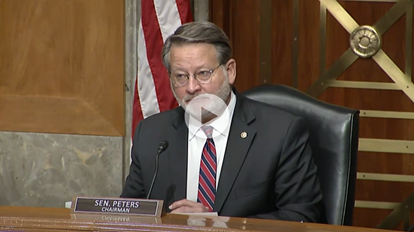VIDEO: Peters Convenes Hearing Examining Department of Defense Failures to Protect Servicemembers, Military Families, and Michigan Communities from PFAS Exposure
Hearing Builds on Peters’ Longstanding Efforts to Address PFAS Contamination Crisis and Hold DoD Accountable
WASHINGTON, D.C. – U.S. Senator Gary Peters (D-MI), Chairman of the Homeland Security and Governmental Affairs Committee, held a hearing with two panels of expert witnesses to examine how servicemembers, their families and communities in Michigan and across the country have been harmed by exposure to toxic Perfluoroalkyl and Polyfluoroalkyl Substances (PFAS) connected to military sites. Peters convened the hearing after a Department of Defense (DoD) Inspector General report found that DoD failed to adequately control PFAS contamination at military sites across the nation – resulting in preventable harm to servicemembers, their families, and the surrounding communities. At the hearing, Peters raised the need to hold DoD accountable for their failure to act – and that they must do more to help clean up contaminated sites.
“Exposure to these chemicals, whether through contact with firefighting foam, or contamination found in groundwater sources, presents serious health and environmental risks to first responders, servicemembers, their families, and the communities surrounding these military sites,” said Peters during his opening statement. “According to this report, despite having information that PFAS exposure presented concerning health and environmental risks, the Department of Defense failed to warn servicemembers, their families, and local communities about these potential risks for five years – unnecessarily putting them in harm’s way.”
Peters continued: “Moving forward, there is more the Department could do to expand their blood testing plan to better track the long-term health consequences of PFAS exposure. Finally, the Department of Defense must do more to work collaboratively with communities and state and local stakeholders who have suffered from PFAS contamination over the years.”
To watch video of Senator Peters’ opening remarks, click here. For text of Peters’ opening remarks, as prepared, click here.
To watch video of Senator Peters’ questions for panel 1 click here. To watch video of Senator Peters’ questions for panel 2, click here.
The hearing’s first panel included federal government witnesses from DoD. The second consisted of state-level independent experts – including Tony Spaniola, Co-Chair of the Great Lakes PFAS Action Network.
During the hearing, Peters and Spaniola discussed how the PFAS crisis has caused significant harm to Michigan communities. For example, PFAS has contaminated local water supplies as well as fish and wildlife due to firefighting activities at the now decommissioned Wurtsmith Air Force Base in Oscoda, as well as at other sites across the state including Camp Grayling, Selfridge Air National Guard Base, K.I. Sawyer Air Force Base, and the Alpena Regional Airport. More than 2 million Michiganders have been exposed to PFAS contamination in their drinking water and PFAS have been found in every Great Lake.
Peters questioned federal government witnesses about the findings and recommendations in the Inspector General report and why DoD failed to alert people about potential harm or exposure to PFAS from military sites on a timely basis. Peters also pressed the first panel of witnesses on why DoD continues to delay remediation efforts at military sites across Michigan and the nation to prevent future harm from exposure to PFAS chemicals – as well as clean up the existing contamination. Both panels of witnesses discussed how these harmful chemicals have affected the human and environmental health of communities across the nation. The committee discussed what more lawmakers can do to ensure the federal government – including DoD – is working with local governments and organizations to combat the PFAS crisis.
The hearing is a part of Peters’ long-term efforts to address PFAS contamination in Michigan and across the country. His bill to help protect firefighters and emergency responders from PFAS exposure in the line of duty has passed the Senate. Peters also helped pass the bipartisan infrastructure law, which invests in clean drinking water and includes dedicated funding to address PFAS contamination. He supported or led provisions in the 2019 national defense bill banning the Department of Defense from purchasing firefighting foams containing PFAS. The bill also immediately prohibited the use of firefighting foams containing PFAS in military training exercises, and enhanced state cooperation with the Department of Defense regarding clean-up due to PFAS contamination stemming from military-related activities.
In September 2018, Peters helped convene the first hearing on PFAS contamination in the Senate, assessing the federal response to contamination and remediation. He then convened a field summit in Grand Rapids in November 2018 to shine a light on how the local, state and federal governments are coordinating their response to PFAS.
###
